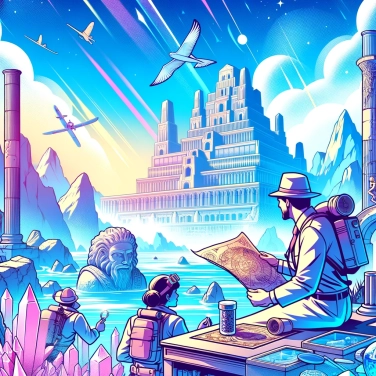Atlantis has captivated explorers and archaeologists because of its mystery and myth that has endured through the centuries, fueling speculation about a vanished advanced civilization.

The ancient tale of Atlantis comes primarily from the Greek philosopher Plato. In his works, Timaeus and Critias, around the year -360, he tells the story of a rich, powerful island, extremely advanced in technology and culture. This people supposedly sank beneath the sea in one night due to their great arrogance towards the gods. The legendary island would be located beyond the famous "Pillars of Hercules," generally identified with the Strait of Gibraltar. These texts have survived through the centuries and sparked the persistent myth of this sunken city, fueling a thousand theories and archaeological research. Many experts believe that Plato created Atlantis to serve as a moral metaphor. Others see it as a distorted memory of a real natural catastrophe. Regardless, the mystery born in antiquity remains very persistent even today.
For centuries, explorers and scholars have sought to link Atlantis to a real location. Among the favored candidates is the Greek island of Santorini, struck around 1600 B.C. by a massive volcanic eruption, engulfing an advanced civilization. The Minoan civilization, based on Crete, has also drawn attention with its imposing palaces and surprisingly modern technologies for the time. More recently, some have proposed hypotheses placing Atlantis near the Strait of Gibraltar, in the Canary Islands, or even beneath the Antarctic. These passionate searches continue to fuel the fascination surrounding this mystery.
No ruin labeled Atlantis has been found to date, but several mysterious archaeological sites strangely echo the legend. For example, in Santorini, Greece, excavations at Akrotiri have revealed a highly advanced ancient city that was brutally buried under tons of volcanic ash around 1600 B.C. Some archaeologists believe that this Minoan civilization may have inspired the legend of Atlantis described by Plato. Others cite the sunken city off the coast of Japan, known as Yonaguni, submerged for millennia beneath the Pacific Ocean. Despite spectacular discoveries over the years, none have yet clearly allowed us to assert: "There it is, that was Atlantis!"
The legend of Atlantis directly prompted several explorers to take to the sea, convinced they would find this mysterious civilization. Christopher Columbus, for example, sincerely believed that Atlantis might be somewhere in the Caribbean. Sir Francis Bacon viewed America as a kind of "resurrected Atlantis," an ideal land filled with riches. Even ancient maps, often inaccurate, sometimes placed a mysterious island thought to represent Atlantis, generating much confusion but also passion among navigators. All this fascination contributed to motivating and shaping certain great maritime crossings, indirectly influencing the history of global exploration.
Atlantis continues to captivate modern minds today with its historical and supernatural dimensions. Some believe it to be an extraterrestrial civilization that influenced our past. Others see it as the forgotten cradle of an ultra-advanced civilization, capable of mastering futuristic technologies. Several authors like Edgar Cayce even refer to an Atlantis endowed with a mysterious crystalline energy with incredible powers, blending healing and destruction. These theories feed both science fiction books and those of alternative researchers. The enigmas surrounding the supposed location of the lost island allow Atlantis to be regularly invoked when unsettling or unexplained archaeological discoveries emerge. Despite the lack of irrefutable evidence, Atlantis continues to act as a curiosity magnet, stimulating our taste for mystery and exploration.
Some researchers believe that the volcanic island of Santorini, destroyed by a powerful eruption around 1600 B.C., could be one of the possible inspirations behind the ancient myth of Atlantis.
During the Middle Ages and the Renaissance, cartographers like Athanasius Kircher included Atlantis on imaginary maps, further contributing to the popularization of research on this lost continent.
Atlantis has become a true pillar of popular culture: novels, comic books, films, and even video games regularly draw upon its story, thus fueling the mystery among the general public.
Edgar Cayce, a famous medium from the 20th century nicknamed 'the sleeping prophet,' claimed that Atlantis contained advanced technology powered by powerful crystals, reinforcing esoteric speculations about the vanished civilization.
Yes, various modern research teams have attempted to locate the potential remains of Atlantis, conducting archaeological and oceanographic explorations in different regions of the world. Nevertheless, these investigations have not yet provided conclusive evidence.
The myth of Atlantis has inspired a multitude of works of fiction, including films, novels, video games, and television series. It has shaped our collective imagination of an idealistic civilization that was submerged, serving as a continuous source of artistic, literary, and cultural inspiration.
As of today, there is no direct and irrefutable scientific evidence confirming the existence of Atlantis as described by Plato. However, several researchers suggest that the account might be based on real events or inspired by past civilizations that experienced natural disasters.
Several regions have been proposed as potential candidates, including the Greek islands (particularly Santorini), the Spanish coast near the Strait of Gibraltar, the Azores in the Atlantic, the Caribbean, and even South America.
Atlantis continues to fascinate as it represents captivating themes such as lost grandeur, mysteriously vanished advanced civilizations, and the possibility of forgotten ancient knowledge. It sparks curiosity, imagination, and inspires exploration and archaeological research.
The first written record can be found in Plato's dialogues titled "Timaeus" and "Critias," dating back to the 4th century B.C. In these works, Plato describes Atlantis as a powerful civilization that sank beneath the sea.

0% of respondents passed this quiz completely!
Question 1/5